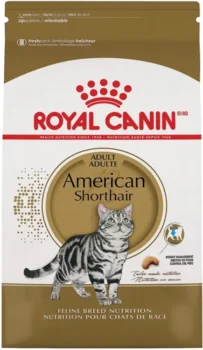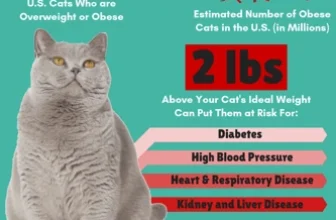As a loving and responsible owner of an American Shorthair, you probably want to ensure that your feline friend stays healthy and happy. One way to do that is by understanding the significance of essential fatty acids in your cat’s diet. These fatty acids are crucial for maintaining your cat’s overall health and wellbeing, and they offer various benefits. However, incorporating essential fatty acids into a cat’s diet can be challenging, and too much or too little of it can cause harm. In this article, we will guide you through everything you need to know about essential fatty acids for your American Shorthair, including their sources, recommended dosage, benefits, and risks. So, let’s dive in and discover all you need to know to keep your cat healthy and thriving.
What are essential fatty acids?

Have you ever heard about the term “essential fatty acids”? These are types of polyunsaturated fats that are vital for your American Shorthair’s overall health and well-being. Essential fatty acids play an essential role in maintaining your cat’s coat, cognitive function, immune system, and much more. However, cats cannot produce essential fatty acids on their own. It is crucial to include them in their diet regularly. In the following sections, we will dive deeper into the importance of essential fatty acids and how to incorporate them into your cat’s diet.
Types of Fatty Acids
Essential fatty acids are types of fats that cannot be produced by the body and must be consumed through a cat’s diet. There are two main types of essential fatty acids: omega-3 and omega-6. Omega-3 fatty acids are primarily found in fish oil and are essential for maintaining healthy skin and coat, as well as supporting a cat’s immune system and cardiovascular health. These fatty acids are also important for neurological development and brain function, making them particularly vital for kittens and young cats.
On the other hand, omega-6 fatty acids are found in plant oils such as soybean and safflower oil, as well as in animal fats. Like omega-3s, they are crucial for maintaining healthy skin and coat, as well as supporting the immune system. Omega-6 fatty acids also play important roles in regulating inflammation and blood clotting.
In addition to omega-3 and omega-6 fatty acids, there are other types of essential fatty acids that cats require, including arachidonic acid and eicosapentaenoic acid (EPA). These too must be obtained through a cat’s diet. Arachidonic acid is found in animal fats, while EPA is primarily found in fish oil.
It’s worth noting that a balance of both omega-3 and omega-6 fatty acids is important for a cat’s health. While omega-3 fatty acids have many health benefits, an excessive intake of them can actually result in health problems. It is important to ensure that your American Shorthair cat is getting the right amount and balance of both essential fatty acids.
To achieve this, pet owners may opt to provide their cat with a balanced diet containing essential fatty acids. Alternatively, supplements may be added to commercial or homemade cat food to ensure they are getting the necessary amounts of omega-3s and omega-6s. When choosing a supplement, it’s important to consider the quality of the product and to consult a veterinarian for further advice.
Ensuring your American Shorthair cat receives an adequate amount of essential fatty acids is just one aspect of maintaining their overall health and wellbeing. Other considerations include their taurine requirements, protein needs, and the proper balance of ash, calcium, and phosphorus in their diet. To learn more about these topics, check out our articles on /taurine-diet-american-shorthair/, /protein-req-am-sh-cat/, and /ash-calcium-phosphorus-needs/.
Importance of Fatty Acids for Your Cat
Essential fatty acids are important for maintaining your American Shorthair’s overall health and wellbeing. They play a vital role in many of your cat’s bodily functions, particularly in maintaining healthy skin and coat, contributing to cognitive function, and supporting the immune system. Here are some key reasons why your cat needs essential fatty acids:
- Healthy Skin and Coat: Essential fatty acids are necessary for maintaining your cat’s skin and fur. A deficiency in these fatty acids can lead to dry, itchy, and flaky skin, as well as a dull coat.
- Cognitive Function: Fatty acids contribute to the proper functioning of your cat’s brain, and some studies have suggested a link between essential fatty acids and improved cognitive function in older cats.
- Immune System Support: Essential fatty acids have anti-inflammatory properties that contribute to your cat’s immune system function, reducing the risk of disease and infection.
- Reproductive Health: Omega-3 fatty acids are particularly important for the reproductive health of your cat. They can help regulate hormones, improve fertility, and reduce the risk of complications during pregnancy and birth.
- Cardiovascular Health: Essential fatty acids help maintain healthy blood pressure, reduce the risk of heart disease and stroke, and support proper circulation.
Given the importance of essential fatty acids for maintaining your American Shorthair’s health, it’s crucial to ensure they are getting enough of them in their diet.
Sources of Essential Fatty Acids
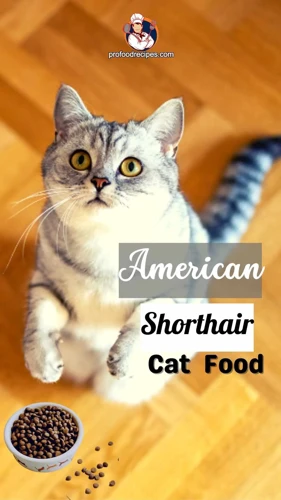
When it comes to incorporating essential fatty acids into your American Shorthair’s diet, it’s important to know where you can find these nutrients. Essential fatty acids cannot be produced by your cat’s body, so they must be obtained through their diet. In this section, we will explore various sources of essential fatty acids that can provide your feline with the nutrients they need to live a healthy life. Let’s dive in!
Omega-3 Fatty Acids
One of the most important types of essential fatty acids for your American Shorthair cat are omega-3 fatty acids. These fatty acids are vital for maintaining your cat’s overall health and well-being. Omega-3s are a type of polyunsaturated fatty acid that are not produced by your cat’s body, meaning that they must be obtained through their diet.
Sources of omega-3 fatty acids include oily fish such as salmon, sardines, and tuna. These fish contain high levels of two important omega-3 fatty acids, eicosapentaenoic acid (EPA) and docosahexaenoic acid (DHA). Other sources of omega-3s include flaxseed, chia seeds, hemp seeds, and walnuts.
The Benefits of Omega-3 Fatty Acids for Your Cat
– Promotes Healthy Skin and Coat: Omega-3s help to nourish your cat’s skin, reducing the risk of dryness, itching, and irritation. They also help to promote a shiny, lustrous coat.
– Supports Brain Health: Research has shown that omega-3s may support cognitive function and reduce the risk of age-related cognitive decline in cats.
– Reduces Inflammation: Omega-3s have anti-inflammatory properties that can help to reduce inflammation in your cat’s body and support healthy joints.
– Improves Heart Health: Omega-3s may help to reduce the risk of heart disease by reducing triglyceride levels and lowering blood pressure in cats.
Incorporating Omega-3 Fatty Acids into Your Cat’s Diet
There are a few ways to incorporate omega-3 fatty acids into your cat’s diet:
1. Feed Your Cat Oily Fish: Incorporate oily fish like salmon or tuna into your cat’s diet. Make sure that the fish is cooked, boneless, and served in small portions to avoid stomach upset.
2. Add Flaxseed Oil or Fish Oil: Some commercial pet foods may not have enough omega-3 fatty acids. Add flaxseed oil or fish oil to your cat’s food as a supplement. Be sure to consult your veterinarian before adding any supplements to your cat’s diet.
3. Make Homemade Treats: If you enjoy cooking for your cat, you can make homemade treats that are rich in omega-3s. Try making salmon treats or adding ground flaxseed to your cat’s favorite treat recipe.
How Much Omega-3 Fatty Acids Does Your Cat Need?
The recommended amount of omega-3 fatty acids for cats is 50-150 mg per kilogram of body weight per day. Consult with your veterinarian to determine the appropriate amount for your cat.
Incorporating omega-3 fatty acids into your American Shorthair cat’s diet can provide many health benefits, including healthier skin, a shiny coat, improved brain health, reduced inflammation, and better heart health. Be sure to consult with your veterinarian before making any dietary changes or adding supplements to your cat’s diet.
Omega-6 Fatty Acids
Essential fatty acids are a vital part of your American Shorthair’s diet. Among the different types of essential fatty acids are omega-6 fatty acids, which play an important role in your cat’s health and well-being.
Omega-6 fatty acids are a group of unsaturated fatty acids that are crucial for various functions in your cat’s body, including the maintenance of healthy skin and coat, the regulation of blood pressure, and the support of the immune system. They are also involved in the production of certain hormones that are important for your cat’s overall health.
However, it’s important to note that omega-6 fatty acids should be consumed in balance with omega-3 fatty acids. An imbalance between these two types of essential fatty acids can lead to inflammation and other health issues.
Incorporating omega-6 fatty acids into your cat’s diet can be done through a variety of sources. Some of the best dietary sources of omega-6 fatty acids for your American Shorthair include oils such as sunflower, safflower, corn, and soybean oil. Other sources include poultry, pork, beef, and eggs.
To make it easier to understand the different sources of omega-6 fatty acids, here’s a table that breaks down some of the top dietary sources:
| Food Source | Amount of Omega-6 Fatty Acids (per 100g) |
|---|---|
| Corn Oil | 49g |
| Soybean Oil | 51g |
| Sunflower Oil | 65g |
| Chicken | 2.5g |
| Beef | 1.8g |
It’s important to note that while omega-6 fatty acids are essential for your American Shorthair’s health, they should be consumed in moderation. Consuming too many omega-6 fatty acids can lead to inflammation and other health issues. Instead, focus on providing a balanced diet that contains both omega-3 and omega-6 fatty acids.
Incorporating omega-6 fatty acids into your American Shorthair’s diet can help promote overall health and well-being. By providing a balanced diet that includes the right amount of essential fatty acids, you can help ensure that your cat remains healthy and happy for years to come.
Other Sources of Essential Fatty Acids
While omega-3 and omega-6 fatty acids are the most well-known types of essential fatty acids, there are other sources of these important nutrients that can be incorporated into your American Shorthair’s diet. Here are some of the best sources of additional essential fatty acids for your feline friend:
| Source | Essential Fatty Acids |
|---|---|
| Flaxseed | Alpha-linolenic acid (ALA) |
| Chia seeds | Alpha-linolenic acid (ALA) |
| Soybean oil | Linoleic acid (LA) |
| Walnuts | Alpha-linolenic acid (ALA) |
| Tuna oil | Eicosapentaenoic acid (EPA), docosahexaenoic acid (DHA) |
Flaxseed and chia seeds are both rich in alpha-linolenic acid (ALA), which can be converted into EPA and DHA in your cat’s body. Soybean oil is a source of linoleic acid (LA), which is an omega-6 fatty acid that can also be found in high amounts in poultry and other meats.
Walnuts are another source of ALA, as well as other important nutrients like protein, fiber, and antioxidants. Tuna oil is a great source of both EPA and DHA, which are important for maintaining a healthy heart, brain, and immune system in cats.
Incorporating these other sources of essential fatty acids into your American Shorthair’s diet can help ensure that they are getting all of the nutrients they need to thrive. However, it’s important to ensure that you are not over-supplementing your cat with essential fatty acids, which can lead to negative side effects. Consult with your veterinarian to determine the best diet for your cat’s individual needs.
Incorporating Essential Fatty Acids into Your Cat’s Diet
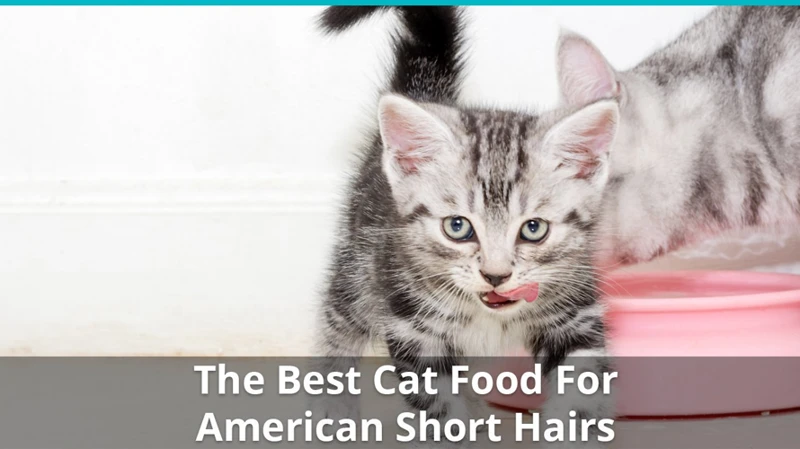
Ensuring that your American Shorthair cat gets the right amount of essential fatty acids is key to keeping them healthy and happy. It can be confusing, however, to know how to incorporate these nutrients into their diet. Thankfully, there are several options available to cat owners, from commercial pet foods to homemade diets. Let’s explore these options and find out how to make sure your cat is getting the essential fatty acids they need.
Commercial Pet Foods
When looking for commercial pet foods that are rich in essential fatty acids, it’s important to read the labels carefully to determine if the food contains the necessary nutrients. Some commercial pet foods are specifically formulated to contain high levels of essential fatty acids, while others may only contain a small amount.
Table: Commercial Pet Foods that are Rich in Essential Fatty Acids
| Brand and Type of Food | Omega-3 Fatty Acids | Omega-6 Fatty Acids | Other Essential Fatty Acids |
|---|---|---|---|
| Hill’s Science Diet Adult Sensitive Stomach and Skin | 0.50% | 2.90% | 0.40% |
| Purina Pro Plan Savor Adult Salmon and Rice Entrée | 0.12% | 1.60% | 0.10% |
| Blue Buffalo Wilderness Indoor Chicken Recipe | 0.50% | 1.80% | 0.20% |
Some brands, like Hill’s Science Diet and Blue Buffalo, offer specific formulations that are designed to address skin and coat health. These foods generally contain higher levels of both omega-3 and omega-6 fatty acids, along with other essential fatty acids.
It’s important to note that not all commercial pet foods that contain essential fatty acids are created equal. Some may contain lower quality ingredients or fillers that can negatively impact a cat’s health. It’s essential to do your research and choose a high-quality pet food that contains natural, high-quality ingredients.
If your American Shorthair has specific dietary needs or requires a specialized diet due to medical conditions, it’s best to consult with your veterinarian before making any changes to their diet. In some cases, your vet may recommend a prescription food that is formulated specifically for your cat’s needs.
Supplements
Supplements are a convenient and effective way to provide your American Shorthair with essential fatty acids. These supplements are available in various forms, including fish oil capsules, liquid supplements, and chews. When selecting a supplement, look for reputable brands that use high-quality ingredients. It is also essential to follow the recommended dosage.
| Type of Supplement | Benefits | Considerations |
|---|---|---|
| Fish Oil: | Rich in Omega-3 fatty acids, which promote cardiovascular health, improve coat and skin condition, reduce inflammation and support brain function. | May cause gastrointestinal upset or unpleasant breath odor if given in excessive amounts. |
| Flaxseed Oil: | Contains Alpha-Linolenic Acid, which converts to EPA and DHA in the body. Helps reduce inflammation and promotes healthy skin and coat. | Less efficient than fish oil in providing EPA and DHA. |
| Borage Oil: | Rich in Gamma-Linoleic Acid, which helps reduce inflammation and promotes healthy skin and coat. | May cause gastrointestinal upset and diarrhea if given in excessive amounts. |
| Evening Primrose Oil: | Contains Gamma-Linoleic Acid, which promotes healthy skin and coat, reduces inflammation. | Less efficient than borage oil in providing Gamma-Linolenic Acid. |
Supplements are not a substitute for a balanced diet. It is still essential to provide your American Shorthair with a well-rounded diet that meets their nutritional needs. Additionally, supplements should be introduced gradually and under veterinary supervision, especially if your feline friend has a pre-existing medical condition or is on medication. With the right dosage and proper precautions, supplements can be a valuable addition to your cat’s diet, promoting their overall health and well-being.
Homemade Diets
If you prefer feeding your American Shorthair a homemade diet, it is still possible to ensure they are getting the essential fatty acids they need. However, it is important to consult with a veterinarian or a veterinary nutritionist to ensure your homemade diet is properly balanced and meets all of your cat’s nutritional needs.
When it comes to incorporating essential fatty acids into a homemade diet, it is important to choose the right ingredients. A variety of ingredients rich in essential fatty acids can be used, including fish such as salmon, sardines, and tuna, as well as poultry and eggs.
Here is an example of a homemade cat food recipe rich in essential fatty acids:
| Ingredients | Amount |
|---|---|
| Ground chicken or turkey | 1 pound |
| Sardines | 1 can (3.75 ounces) |
| Egg yolks | 2 |
| Cooked sweet potato | 1 cup, mashed |
| Multivitamin supplement* | As recommended on package |
| Fish oil supplement** | 1,000 mg |
*Choose a high-quality multivitamin supplement designed for cats, and follow the recommended dosage on the package.
**Choose a high-quality fish oil supplement designed for cats, and follow the recommended dosage on the package.
This recipe provides a balanced diet that includes plenty of essential fatty acids in the form of fish and egg yolks. The addition of a high-quality multivitamin supplement ensures that your American Shorthair is getting all of the other vitamins and minerals they need.
However, it is important to note that not all homemade diets are nutritionally balanced, and some may be deficient in certain essential nutrients. This is why it is essential to consult with a veterinary nutritionist or veterinarian before feeding your cat a homemade diet. They can provide you with a recipe that is tailored to your cat’s specific needs and ensure that it is nutritionally balanced.
How Much Essential Fatty Acids Does Your Cat Need?
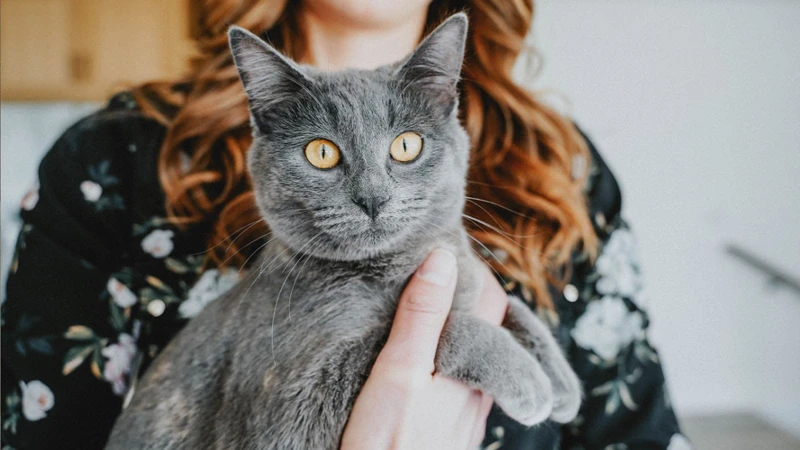
Determining the proper amount of essential fatty acids for your American Shorthair is crucial. However, it’s essential to remember that the needs of each cat may vary depending on their age, weight, and overall health condition.
The National Research Council recommends a daily intake of 20-55 mg/kg of body weight of linoleic acid and 0.5-5% of the daily energy requirement for arachidonic acid. At the same time, a cat’s daily requirement for Omega-3 fatty acids may range from 0.5%-2% of their diet.
It’s essential to note that a deficiency or an excess amount of essential fatty acids can lead to health issues. Too much Omega-6 can cause inflammation, while a lack of fatty acids can lead to skin and joint problems.
To ensure your American Shorthair receives the recommended amount of essential fatty acids, monitor their daily food intake and supplement their diet if necessary. Your vet can recommend a particular supplement dosage based on your cat’s individual needs.
Bear in mind that cats need a well-balanced diet consisting mainly of proteins. An excessive intake of essential fatty acids without other crucial nutrients may lead to nutritional imbalances and health problems for your feline friend.
Benefits of Essential Fatty Acids for Your Cat

Essential fatty acids play a crucial role in your American Shorthair’s overall health and well-being. These unsaturated fats are necessary for normal physiological functioning and can provide a number of benefits for your furry friend.
Promotes Healthy Skin and Coat
Essential fatty acids are essential for maintaining healthy skin and a shiny coat in your cat. Omega-3 and omega-6 fatty acids, in particular, are important as they help to nourish the skin and hair follicles, leading to a lustrous coat. A diet lacking essential fatty acids can result in dry, scaly skin, and a dull, unkempt coat.
Strengthens the Immune System
Essential fatty acids play a crucial role in maintaining a healthy immune system in your cat. They help to support the immune response by reducing inflammation and promoting the production of certain immune cells. This is especially important for older cats or ones with weakened immune systems, as it can help to prevent infections and other health issues from developing.
Improves Joint Health
Omega-3 fatty acids are important for maintaining joint health in cats. Research has shown that these fatty acids can help reduce joint pain and inflammation, which is especially beneficial for cats with arthritis. Incorporating foods or supplements rich in omega-3s can help improve your cat’s mobility and overall comfort.
Supports Cognitive Function
Essential fatty acids are also important for maintaining cognitive function in your cat. Omega-3s, in particular, have been shown to promote brain health and can even improve learning and memory. This is especially important as your cat ages and may be at risk for cognitive decline or dementia.
Prevents Certain Health Issues
Including essential fatty acids in your cat’s diet can also help to prevent certain health issues. For example, research has shown that omega-3s may reduce the risk of heart disease and certain types of cancer. Additionally, they can help to regulate blood pressure and cholesterol levels, reducing the risk of developing health problems associated with these issues.
Incorporating essential fatty acids into your American Shorthair’s diet can have a number of health benefits. Whether you choose to include fatty acid-rich foods or opt for supplements, ensuring your cat has a healthy intake of these nutrients can help maintain their overall health and well-being.
Deficiency and Excess of Essential Fatty Acids
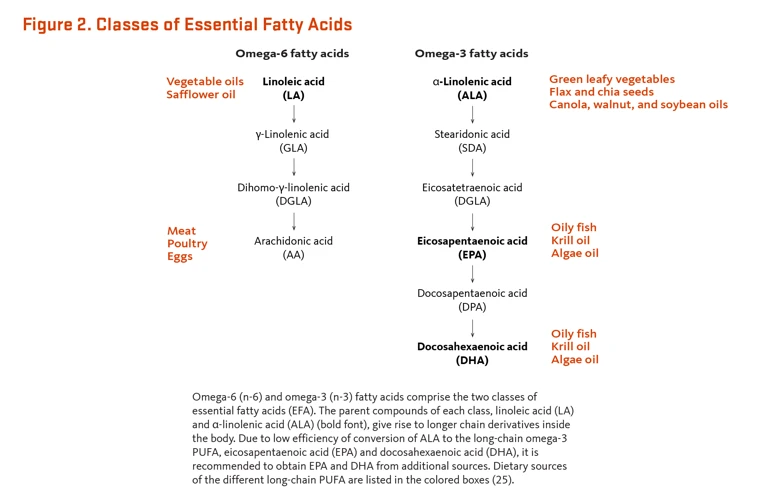
A deficiency or excess of essential fatty acids in your American Shorthair’s diet can lead to various health problems. A deficiency of omega-3 and omega-6 fatty acids can result in dry skin, dandruff, and a dull coat. This is because omega-3 and omega-6 fatty acids play a vital role in the health and maintenance of your cat’s skin and coat.
Additionally, a deficiency of essential fatty acids in your cat’s diet can lead to impaired vision, slow growth, and weakened immunity. This is because essential fatty acids are required for proper functioning of many biological processes, including immune system response.
On the other hand, an excess of essential fatty acids can also have negative effects on your cat’s health. Too much omega-3 fatty acids can lead to bleeding disorders, while an excess of omega-6 fatty acids can lead to inflammation and contribute to the development of chronic diseases.
It’s important to provide your American Shorthair with a balanced amount of essential fatty acids to avoid both deficiency and excess. The optimal ratio of omega-3 to omega-6 fatty acids is a topic of debate among experts, but it’s generally recommended to provide your cat with a diet that contains a higher proportion of omega-3 than omega-6 fatty acids.
It’s important to monitor your cat’s diet and ensure they are receiving the proper amount of essential fatty acids. If you notice any symptoms of deficiency or excess, such as skin issues or inflammation, consult with your veterinarian to determine the best course of action.
Side Effects and Risks of Essential Fatty Acids
While essential fatty acids are crucial for your American Shorthair’s health, there are also some potential risks and side effects to be aware of. It is essential to provide your pet with the right amount of essential fatty acids to avoid any adverse effects.
Excess Intake of Essential Fatty Acids: While essential fatty acids are required for several body functions, overconsumption of these acids can lead to some adverse effects. Some cats may experience diarrhea, vomiting, and weight gain if they get too many essential fatty acids. It’s essential to follow your veterinarian’s recommendations and avoid supplementing your cat’s diet without consulting them first.
Omega-6 to Omega-3 Imbalance: In cats, an imbalance of omega-6 and omega-3 essential fatty acids can cause inflammatory conditions, autoimmune diseases, and skin issues. Typically, cats require more omega-6 fatty acids in their diet than omega-3 fatty acids, but the ideal ratio would be around 5:1. To prevent such potential health problems, it’s essential to maintain a balanced diet for your American Shorthair.
Interference with Blood Clotting: While essential fatty acids have numerous health benefits, they can also interact with blood clotting and anticoagulant medications. Cats affected by hemophilia or taking any medications that affect blood clotting should be appropriately monitored for any complications. Consult with your vet and ensure that your cat is not taking any conflicting medicines.
Quality of Commercial Pet Foods: The quality of commercial pet foods can vary significantly. Some lower quality pet foods may contain low amounts of essential fatty acids and, in some cases, not provide the correct balance of omega-3, and omega-6 fatty acids. Look for pet foods that have guaranteed analysis, and make sure the essential fatty acids provided are of good quality.
By maintaining the appropriate balance of essential fatty acids in your cat’s diet, it’s possible to avoid these potential risks. Always consult with your veterinarian before making any significant dietary changes or incorporating supplements to your cat’s diet. Sticking to a balanced diet that’s ideal for your cat’s age, breed, and weight can help maintain good health and prevent any unwanted side effects.
Conclusion
After learning about the importance of essential fatty acids for your American Shorthair, it’s clear that these nutrients play a vital role in maintaining your cat’s health and well-being. With proper incorporation of these fats into your cat’s diet, you can help support their cardiovascular health, immune system, brain function, and more.
When it comes to sourcing essential fatty acids, there are a variety of options to choose from. Commercial pet foods often include essential fatty acids, but supplements and homemade diets can also provide your cat with these important nutrients. However, it is important to ensure that the sources of essential fatty acids in your cat’s diet are legitimate and of high quality.
It’s also crucial to understand the appropriate amount of essential fatty acids that your cat needs, as too little or too much can lead to various health issues. Work with your veterinarian to determine the ideal amount of essential fatty acids for your cat’s individual needs.
While the benefits of essential fatty acids are numerous, it’s important to be aware of the potential risks and side effects. However, as long as the guidelines for incorporating essential fatty acids are followed, the risks and side effects are minimal.
Overall, with the right care and attention to your American Shorthair’s dietary needs, essential fatty acids can play an important role in supporting their overall health and well-being. Consider speaking to your veterinarian about the best ways to incorporate these essential nutrients into your cat’s diet. With proper attention and care, you can help ensure that your cat is getting the essential fatty acids they need to thrive.
Frequently Asked Questions
1. Can cats produce essential fatty acids on their own?
No, cats cannot produce essential fatty acids on their own, so they need to get them from their diet.
2. What foods are high in omega-3 fatty acids?
Foods high in omega-3 fatty acids include fish, such as salmon and tuna, flaxseed, chia seeds, and some types of algae.
3. Are there any risks to giving my cat supplements for essential fatty acids?
Yes, giving your cat too much of certain types of supplements, such as fish oil, can lead to an overdose of vitamin A and D, which can be dangerous.
4. Can a lack of essential fatty acids cause skin problems in cats?
Yes, a lack of essential fatty acids can lead to dry, itchy skin and a dull coat in cats.
5. Can American Shorthair cats benefit from essential fatty acids?
Yes, American Shorthair cats can benefit from essential fatty acids, as they can help support a healthy coat and skin, as well as overall health.
6. Should I avoid giving my cat too many foods high in omega-6 fatty acids?
While omega-6 fatty acids are important for your cat’s health, it’s important to make sure they are receiving a balanced amount of both omega-3 and omega-6 fatty acids.
7. Can essential fatty acids help with joint pain in cats?
Yes, certain types of essential fatty acids, such as those found in fish oil, have been shown to help reduce inflammation and support joint health in cats.
8. Can essential fatty acids improve my cat’s cognitive function?
Yes, some studies have shown that essential fatty acids can improve cognitive function and brain health in cats.
9. Are there any plant-based sources of essential fatty acids for cats?
Yes, flaxseed and chia seeds are both plant-based sources of essential fatty acids that can be added to your cat’s diet.
10. How can I tell if my cat is getting enough essential fatty acids?
Symptoms of a deficiency of essential fatty acids can include dry, itchy skin, a dull coat, and cognitive decline. You can also talk to your veterinarian about your cat’s diet to ensure they are receiving a balanced amount of essential fatty acids.

